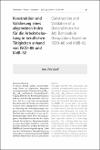Konstruktion und Validierung eines allgemeinen Index für die Arbeitsbelastung in beruflichen Tätigkeiten anhand von ISCO-88 und KldB-92
Construction and Validation of a General Index for Job Demands in Occupations Based on ISCO-88 and KldB-92
Kroll, Lars Eric
In diesem Beitrag werden zusammenfassende Skalen zur allgemeinen, physischen und psychosozialen Arbeitsbelastung (ABges, ABphy, ABpsy) auf Basis der Erwerbstätigenbefragung 2006 für die Berufsklassifikationen KldB-92 und ISCO-88 entwickelt und validiert. Ziel ist es, eine leicht anzuwendende Kontrollvariable für Studien bereitzustellen, in denen keine umfangreichen Instrumente zur Messung von Arbeitsbelastungen eingesetzt werden können. Einleitend wird ein Überblick über verschiedene Formen von Arbeitsbelastungen sowie deren Messung gegeben. Anschließend werden die drei Skalen anhand hierarchischer Regressionsmodelle in einem dreistufigen Verfahren entwickelt. Der Index wird zuletzt auf Basis der Daten der BIBB/BAuA-Erwerbstätigenbefragung 2006 und des Telefonischen Gesundheitssurveys „Gesundheit in Deutschland Aktuell“ (GEDA) 2009 des Robert Koch-Instituts anhand von Gesundheitsindikatoren intern und extern validiert. Insgesamt erweist sich der Index bei der Analyse von gesundheitlichen Beeinträchtigungen, von wahrgenommenen Gesundheitsrisiken am Arbeitsplatz und bei der Analyse von krankheitsbedingten Fehlzeiten auf Basis beider Datensätze als aussagekräftig. Er wird daher für Forschungszwecke bereitgestellt und lässt sich anhand der Schlüsselvariablen KldB-92 oder ISCO-88 beliebigen Datensätzen zuspielen. This paper describes the construction and validation of comprehensive scales for overall, physical and psycho-social job demands (ABges, ABphy, ABpsy) that were constructed using a large-scale representative survey from 2006 conducted by the German Federal Institute for Vocational Education and Training (BIBB). The overall goal is to provide comprehensive scales that can be applied in studies that are not able to measure job demands more thoroughly. The scales are based on standard occupational classifications. They were constructed using multilevel regression models in a three-stage procedure. The resulting index has been validated using seven different health indicators with the data of the German BIBB/ BAuA-workforce survey and additional data of the GEDA: German Telephone Health Survey 2008/2009. Results indicated significant associations with health outcomes such as self-perceived health, perceived health risks at work or sick absence days. The index is free to use for scientific research and can be matched to any data source with data on occupations classified by KldB-92 or ISCO-88.
No license information

